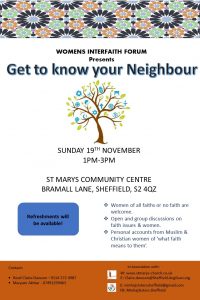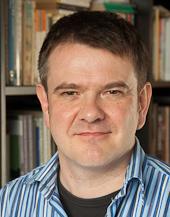Sheffield Interfaith (SIF) are local people who are working together to promote mutual respect and interfaith dialogue in Sheffield. We achieve this by getting to know each other at regular ‘Food and … Read more ...
Food & Friendship, Tuesday October 23rd 6.00-8.00 pm at Shirley House Interfaith Centre
Food and Friendship
Tuesday 23rd Oct 2018
at 6.00-8.00pm
Every month Sheffield Interfaith invite you to join us for a ‘bring & share’ meal, usually at Shirley House Interfaith Centre, 31 Psalter Lane, S11 8YL. Why not come and see? Meet new people and make new friends. People of all faiths (and food traditions), or none, are most welcome.
It was suggested at the AGM that it would be a good idea to hold these dinners at other places of worship, so individual faith groups could have contact with Sheffield Interfaith. If your faith group would like to ‘host’ a SIF bring and share meal, please get in touch, via the website.
Planned dates for the next few months are:
Monday 26th November
Wednesday 19th December
Thursday 24th January 2019
Tuesday 19th February 2019
You could use one of these dates or offer a date after February- we try not to clash with religious festivals.
We welcome everybody who would like to come
at Shirley House, 31 Psalter Lane, Sheffield S11 8YL
Tuesday 23rd Oct 2018
at 6.00-8.00pm
(Number 4 bus leaves Sheffield Interchange at 17.35)
A History of Sheffield Interfaith – Origins and Early Years – by Debjani Chatterjee
For those of us who have more recently become involved in interfaith activities in Sheffield it is very interesting to read about how and why Sheffield Interfaith came into being and some of the people who made it happen.
Debjani Chatterjee was involved from before the beginning and wrote this in June 2018. If anyone can remember any names or dates she has forgotten, please get in touch.
Sheffield Interfaith – the Beginning and Some Reflections
11th September 1993, the centenary of the World Parliament of Religions, is officially the date that Sheffield Interfaith (SIF) started. Courtesy of Sheffield City Council, who provided a central venue in the form of the Reception Rooms at Sheffield Town Hall, Sheffield Racial Equality Council (SREC) had called a large public meeting.
I became Director of SREC in 1984 and, in the following years, I had tried unsuccessfully to persuade chairpersons that it would be a good thing for us to help set up Sheffield Interfaith. As a Community Relations Council, our role was to promote good community relations. My colleagues and I took up cases of racial discrimination and harassment, and I would give talks on such subjects as the meaning of positive discrimination and the benefits of ethnic monitoring. But I grew increasingly concerned that current race legislation did not address the religious discrimination and harassment that were clearly on the rise as the 1980s progressed. Racial equality could not be promoted on its own, it seemed to me; it had to be part of a larger vision of equal opportunities that embraced gender, disability, sexual orientation, age, class and religion. Religious discrimination could and did affect people of all religions and none. In some instances, as in the case of the exclusion of turbaned Sikhs from certain jobs and buildings, and the desecration of Jewish graves, it was possible to argue that these were both religious and ethnic groups. But no one in community relations could be unaware of the growing tide of Islamophobia in particular, and, it seemed to me, our laws were not addressing this.
My own past experience as an RE teacher and my continued involvement in our local Standing Advisory Council on Religious Education (SACRE), confirmed my belief in the importance of public awareness of religious diversity. In nearby places like Bradford, York, and Manchester, I witnessed at firsthand the work of interfaith bodies. Friends would invite me to come and participate in an interfaith walk or attend an interfaith talk, and I was sorry that our city did not have the equivalent. It would be most untrue to say that no interfaith activities had happened in Sheffield, but they had been piecemeal attempts. Some were restricted to specific areas of Sheffield such as Burngreave; while others were limited to creating Christian-Muslim solidarity, or to promoting religious harmony among students. Compared to some parts of the country, Sheffield people were more tolerant and accepting of difference. Nevertheless, we could not be complacent – all prejudice and bigotry needed to be addressed, and we all had a part to play in this. SREC’s Chairperson at that time, Dorothy Dixon-Barrow, agreed that something should be done, but felt strongly that it was not the role of a community relations council to set up an organisation for interfaith dialogue and understanding.
I argued that, when a need had been identified, SREC had helped to establish an independent Law Centre in Sheffield. But ‘all community relations councils are secular bodies,’ she said, ‘and that is our strength. While some member organisations are religious bodies, we can’t be supporting the setting up of anything religious.’ Dorothy was a wonderful woman of Jamaican and mixed Jewish heritage; she taught me a lot, and I loved and respected her greatly. But we differed on this matter; I could not persuade her that it was in the interest of community relations that we act as a catalyst and facilitate the setting up of an independent and city-wide body that would be multi-faith and also inclusive of people with humanist or other non-faith beliefs. Dorothy’s successor as Chairperson, a very affable Sri Lankan gentleman, Chandran Owen, thought it unwise to depart from Dorothy’s position. At the same time, I knew that their view was not a general one within the membership at large. There were active members like Hector Franklin, Saleema Imam, Molly Kenyon, Mohammed Nazir and others who would take a different stance. It was a matter of waiting.
When Chandran Owen was succeeded by Councillor Haji Mohammed Nazir, SIF’s time had come. The new Chairperson was already keen. The ideal date too presented itself. 11th September 1993 was the centenary of the World Parliament of Religions, a great date to celebrate for anyone involved in interfaith matters. It was also special for me because one of my heroes, Swami Vivekananda, had attended that Parliament in Chicago and given a famous and rousing speech on that date. Using the analogy of a frog in a well, he had explained religious discord thus: ‘I am a Hindu. I am sitting in my own little well and thinking that the whole world is my little well. The Christian sits in his little well and thinks the whole world is his well. The Muslim sits in his little well and thinks that is the whole world.’
SIF’S first public event was a great success. I think between 60 and 80 people attended that early evening meeting. A unanimous decision was reached that SIF should continue from then onwards. It would not be affiliated to any church or other religious body, nor to any political group. It would also be independent from SREC and Sheffield City Council, though all were welcome to participate and help. A small SIF committee of no more than half a dozen enthusiasts was set up with SREC’s Chairperson, Haji Mohammed Nazir, as its first Chair. A delightful Bahai couple, Cyrus and Sandra Agahi who ran the Peace Guest House, would try to ensure that one of them came to committee meetings. A very gracious woman from Sheffield’s Brahma Kumaris’ centre was also a regular, as was a bearded gentleman from a Christian-Muslim Dialogue group who bicycled to all our meetings. Dev Dhillon, who represented the Sikh gurdwara on SREC, doubled up on SIF too, though his job in Doncaster made it difficult for him to attend.
I was a member of the committee, and our first monthly meetings were held in my office during weekday evenings. Rev Cassandra Howes, who was known universally as Sandra and was Sheffield Hallam University’s Chaplain at the time, had been very active in transforming the Chaplaincy into a multi-faith centre. She became our first and very able Secretary. Soon she too began to host occasional evening meetings. This became very necessary as I left Sheffield for a while to work in Oxfordshire. When it was time for Sandra also to leave Sheffield, SIF gave her a wonderful farewell on 14th February 2002. This was held at Channing Hall, Surrey Street, a city centre venue that was part of Upper Chapel belonging to the Unitarian Churches. Sandra’s successor as SHU’s Chaplain, Ian Maher continued to let us meet at the Multi-faith Chaplaincy, but Rev Geoffrey Ronald Usher from Upper Chapel also offered us space to meet in his church. Geoff, as we all called him was a delightful Australian, a gentle giant with a booming voice who was our Treasurer for many years.
The intention was always that our committee would meet regularly and would also organise one or two large events annually, usually at city centre venues, focusing on issues of topical concern to members – events that would be open to all. An example was an interfaith conference that we held on 10th May 1998 from 12.30-6pm at Sheffield Hallam University’s Atrium at Pond Street. Another was a conference that we held at the Central United Reformed Church on Norfolk Street a few years later on the subject of human trafficking and what we in Sheffield could do to help. Refugees, homelessness, discrimination, and ecology, have also – rightly – engaged our members. Sometimes our events would coincide with our AGM and often there would be a celebratory feel to the event with a poetry reading, dancing or songs and music from various faith traditions. On 8th May 2005 SIF’s AGM was held at the Quaker Meeting House. Our speaker was a holocaust survivor and we also had a poetry reading. It was also Geoff Usher’s last AGM as he returned to Australia soon afterwards.
There would also be the occasional smaller event, sometimes a multi-faith prayer meeting or a discourse on a topic of interest that was for our members to better understand each other’s traditions and perspectives. John, a very modest elderly Christian on our committee undertook the role of organising visits for members to various places of worship. He would first contact the relevant synagogue, mosque, church, gurdwara or temple to ask if a visit would be welcome and convenient, whether we could join their worship or should observe, and if there would be someone available to guide us and to explain any customs and practices. SIF also organised interfaith walks for peace in Sheffield, in places like Pitsmoor and Netheredge. Sometimes we joined forces with other groups like Burngreave Ashram or Shirley House that were doing good work of an interfaith nature in specific localities. We happily joined with Sheffield City Council in creating an Interfaith forest garden in the Parkwood area, a garden whose maintenance still calls for our voluntary participation. Celebrating National Interfaith Week in Sheffield with meditation, shared food, storytelling, prayers, discussions and readings, etc. has also occupied SIF members from an early date.
One of the best things about SIF has been its inclusivity. Members can be from any faith or none. At a time when the national Inter Faith Network would only accept in its membership faith groups that were considered to belong to ‘world religions’, SIF has always had an open-door policy and a determination to be egalitarian. This approach has certainly enriched us, and among our excellent chairs have been Lynn Rishworth, Local Co-ordinator of the Pagan Federation, and a Humanist celebrant, Roy Gordon Sinclair.
I had hoped that SIF would apply for funding and then have its own centre, however modest, and paid staff. But in our three decades of existence, this has not been a route taken by SIF. Perhaps that has given us more independence; I think it has also contributed a more informal and perhaps even laid-back style to the organisation. Some of our activities have been picked up and are being done by others, with or without SIF members involved. The energies of a few SIF members have also gone into the Faith Leaders Forum, a government-funded body that was set up by Rev Inderjit Bhogal among others. In recent years, SIF has received a measure of much-needed administrative and technical support from Shirley House Interfaith Centre in the Netheredge area. We now share a website with Shirley House and the Multifaith Chapel & Library of Burngreave Ashram. I see joint activities as helpful and mutually rewarding.
SIF’s speakers have usually been from within Sheffield as our city has many inspirational people from all faiths and none. But occasionally, SIF have invited a speaker from outside Sheffield. I recall, for instance, the Muslim who came from Bradford to tell us about his good work there with young people. A highpoint for me was the AGM in which one of our founders, Sandra, was our visiting guest speaker.
As I write this, several founder-members have died and others have left the city. Only Haji Nazir and I are still in Sheffield. SIF, like Sheffield itself, has seen many changes. But one constant remains – its members are people who reflect our city’s diversity and vibrancy. Sheffield is the UK’s first City of Sanctuary and its people are not sitting, in Swami Vivekananda’s words, each in their own little well. We know that we are lucky in Sheffield to have the whole world and so many of its ‘wells’ at our doorstep.
DR DEBJANI CHATTERJEE, MBE
Founder-member, Sheffield Interfaith
23rd June 2018
A useful insight from Mahatma Gandhi
“I do not want my house to be walled in on all sides and my windows to be stuffed. I want the culture of all lands to be blown about my house as freely as possible. But I refuse to be blown off my feet by any”
Quakers’ Response to ‘Punish a Muslim’
Sheffield and Balby Quaker Meeting met on Sunday 11th March and expressed their deep sorrow and outrage on hearing of the letter circulated by person or persons motivated by hate. Entitled “Punish a Muslim day”, the letter urges an escalating series of “punishments”. We Quakers wish to offer a hand of friendship and solidarity to all Muslim communities and invite people of all faiths and none to stand with them against racism and hatred.
No doubt most of us agree with this Quaker statement, further responses will be published shortly.
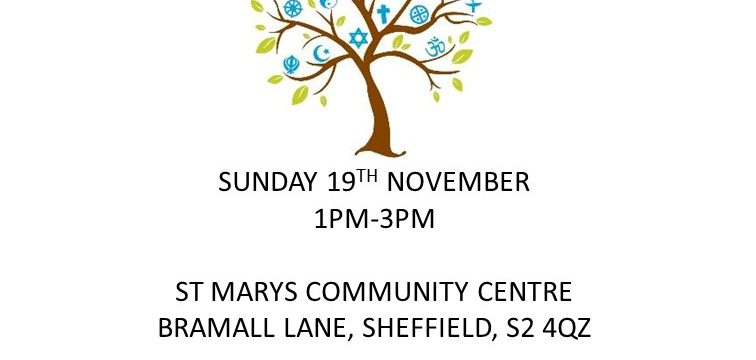
A new Interfaith Group for Women
Gurudev Rabindranath Thakur: A Multi-faceted Genius – Hindu Samaj Centre Sun. 8th October 3pm-5.30pm
Gurudev Rabindranath Thakur: A Multi-faceted Genius
– Hindu Samaj Centre
21, Buckenham Street, Sheffield S4 7JQ
Sun. 8th October 3pm-5.30pm – This community event, featuring poem recitations by children, posters, a story, dances, songs and a docu-film (with sub-titles), celebrates the multi-talented genius of Rabindranath Tagore. All are welcome. Tickets: Free, no need to book.
Rabindranath Tagore (1861 – 1941) was the first non-European to win the Nobel Prize for Literature in 1913, when his Gitanjali, with its ‘profoundly sensitive, fresh and beautiful verse’, was published. Called ‘Gurudev’ or ‘Divine Teacher’, he was a polymath who reshaped Bengali music, language and literature, as well as Indian art and education.
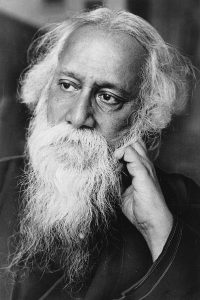 The Programme will be drawn from:
The Programme will be drawn from:
3pm Welcome
National anthems & translations
Recitations by Bal Gokulam children
Dance by children
‘Kabuliwalla’ – Tagore’s famous story retold by Nita Basu Chaudhuri
Songs by Amit Bhaduri & members of Bengali Women’s Support Group
Dance by Shahzad Khan
Dance by Bisakha Sarker MBE
Prof. Bashabi Fraser to introduce a film on Tagore
4pm ‘Images Unbound: the life & times of Rabindranath Tagore’ – Docu-film by Mujibar Rahman
5.35pm Thanks
Tea & samosas
Our Guests of Honour are:
Bisakha Sarker MBE & Bashabi Fraser
href=”http://sheffieldinterfaith.org.uk/wp-content/uploads/2017/09/Bisakha-Sarker.jpg”>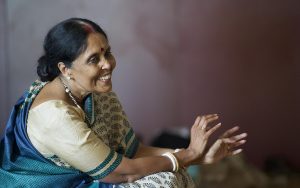


Tagore Talk, Discussion & Readings Sat. 7th October 6pm-7.30pm University of Sheffield
Rabindranath Tagore: Great Sentinel of Freedom
– Humanities Research Institute, University of Sheffield, 34 Gell Street, Sheffield S3 7QY
Sat. 7th October 6pm-7.30pm –Professor Bashabi Fraser, Director of the Scottish Centre for Tagore Studies, will talk about Rabindranath Tagore, his views on freedom, education and internationalism, and the continued relevance of this much-loved writer-philosopher and Nobel laureate. Debjani Chatterjee MBE will chair a discussion and brief readings of Tagore’s work. Tickets: Free, no need to book.
Rabindranath Tagore (1861 – 1941) was the first non-European to win the Nobel Prize for Literature in 1913, when his Gitanjali, with its ‘profoundly sensitive, fresh and beautiful verse’, was published. Called ‘Gurudev’ or ‘Divine Teacher’, he was a polymath who reshaped Bengali music, language and literature, as well as Indian art and education.
The main speaker Bashabi Fraser is a well published Professor of English and Creative Writing, and Director of the Scottish Centre of Tagore Studies at Edinburgh Napier University. Setting the historical scene will be historian Oliver Godsmark, who lectures on International History at the University of Sheffield, and has a special interest in modern South Asia, decolonisation and Partition.
Other panelists include Senior Lecturers from the University’s English Department: Ranjan Sen, a Historical Linguist with a special interest in sound change, and Richard Steadman-Jones whose field is the History of Ideas. A fourth panelist is Tagore scholar and Rabindra Sangeet singer Ashim Dutta from the universities of Dhaka and York. All have an interest in cross-cultural encounters.
What is Zen Buddhism – Talk at Shirley House Interfaith Centre 28th June
There are many strands of Buddhism, originating in various Asian countries. Gensho (Richard Jones) will talk about the Zen a way of life, where meditation is a central part. Those of a certain age may learn how motorcycle maintenance is (not) involved, and dispel some other myths.
Open to all faiths and everybody
Refreshments included
at Shirley House, 31 Psalter Lane,
Sheffield S11 8YL
on Wednesday 28th June 2017
at 7.30 pm
Contact office@standrewspsalterlane.org.uk or 0114 267 8289 for further details

INTERFAITH COUPLES
Message from Bradford
Barbara Glasson is the Team Leader of the Touchstone Centre in Bradford (a majority Muslim City) http://www.touchstone-bradford.org.uk and Deputy Chair of the West Yorkshire District.
Listen to Barbara how prays:
In this post-Brexit world, the need for interfaith understanding is crucial. We need to understand our neighbours of different faith, to work together to strengthen
communities, to make space for honest conversation and to grow in confidence to
challenge injustice. Touchstone has worked for 30 years in the heart of Bradford and is a key-player in interfaith work both locally and nationally. By our own efforts and the generosity of many people and Churches we have raised nearly 80% of the capital needed to move into new premises and to continue to grow and develop our work. We’re nearly there but we need your help to bridge the gap …… we believe we can do it, but we urgently need your help!If you can help us, with a one off donation or regular gift please complete and return the form (downloadable from the website) to Touchstone, 32 Merton Road, Bradford BD7 1RE http://www.touchstone-bradford.org.uk (01274 721626) Thank You!
You can also become a friend of Touchstone and help them continue their work as a centre of excellence for interfaith understanding and dialogue; again, find the form on the website.


